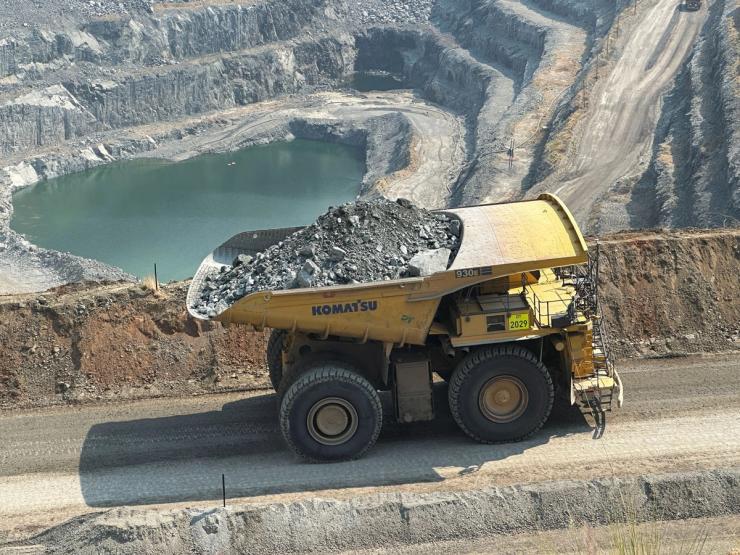The News
African countries should coordinate mining policies to avoid the continent becoming trapped in a cycle of low-value extraction, South Africa’s mining minister said.
Gwede Mantashe, speaking at a mining event on the sidelines of the G20 summit in Johannesburg, said regional governments and African institutions should work together on exploration, pricing, and processing, rather than each state negotiating alone with multinational companies and weakening the continent’s collective bargaining power. He said South Africa, with its deep mining ecosystem and large domestic market, is “well placed to lead a continental response.”
Mantashe warned that African states are “running down their reserves without replacing them,” while multinational companies continue to dictate the terms of trade. He urged African producers to “unite as a producing continent” and end what he called a “race to the bottom” in tax breaks and licensing concessions.
A senior official in Mantashe’s department, speaking on condition of anonymity, told Semafor the minister had not yet discussed the issue of coordination with other African mining ministers. The person said South African government officials had discussed approaching a multilateral body, such as the African Union or UN, to explore what a continental mechanism could look like.
Know More
Mantashe’s remarks come amid intensifying global competition for battery metals and rare minerals. Some estimates suggest Africa holds as much as 30% of known key minerals reserves but processes only a small fraction of them. Meanwhile, climate-related trade measures, including Europe’s carbon border levy, continue to raise costs for African exporters already operating under tight margins.
Mantashe said definitions of “critical minerals” reflect the priorities of wealthy economies — defense in the US and green technology in Europe — while African priorities remain jobs, export earnings, and energy security. “Our minerals are critical for them, not for us,” he told delegates. “We must define our own interests — and act on them together.”
Sam’s view
Mantashe’s coordination push is compelling in theory: Africa’s mineral wealth is dispersed, bargaining power is weakened by fragmentation, and the global scramble for critical minerals rewards scale. Aligning exploration funding, pricing, and midstream strategy makes intuitive sense. No single African country can capture full value alone.
Politically, however, the idea is far more complicated. African governments guard sovereignty fiercely, and regional cooperation often collides with long-standing sensitivities, competing national interests, and mistrust of dominant economies. Not every capital will readily embrace an idea perceived to originate in Pretoria; South Africa’s economic weight could prompt suspicion.
To gain credibility, any coordination effort would need AU-level neutrality — an institutional mechanism seen as continent-led, not South Africa-led. Anything short of that will struggle to overcome political egos, uneven state capacity, and the instinct to negotiate alone.
Even then, coordination will only work if the industrial fundamentals are in place: stable electricity, competitive logistics, predictable regulation, and deep pools of long-term capital — areas where African producers remain constrained. Mining companies excel at extraction because that is their business model; processing is a manufacturing activity requiring different investors, technologies, and risk appetite.
The global minerals reset is unfolding in real time. If African countries cannot organize collectively — or fix their domestic infrastructure bottlenecks — they risk remaining solely the exporters of raw minerals while the other nations that process them extract greater rewards.
Room for Disagreement
Mantashe’s argument may be based on an assessment that overstates the continent’s mineral wealth. Africa’s share of global “critical minerals” production and reserves is actually less than 5%, far less than the 30% often cited by analysts, Bright Simons, an analyst at Accra-based think tank IMANI, wrote in a recent Semafor column.
Simons said this “mischaracterization” was driving both US-Africa policy strategists in the White House and pro-Africa analysts on the continent who are keen to improve Africa’s geopolitical standing. Instead, he wrote, the potential of the continent’s mining industries should be reframed around which minerals would most benefit the continent.
The View From the UN
UN Assistant Secretary-General Ahunna Eziakonwa said the global critical-minerals boom is the “biggest resource opportunity in a lifetime” for the continent — but warned that Africa risks repeating past cycles of exporting raw minerals without these sales spreading wealth among the wider populace. “The question is no longer how the world can secure Africa’s minerals, but how Africa’s minerals can secure Africa’s prosperity,” said Eziakonwa, who heads the UN Development Programme’s work in Africa.
She argued that the continent’s constraints are political rather than geological. “We don’t have a geological problem. We have a governance problem, an ambition problem, and a fragmentation problem.” Short political timeframes — four to seven years — clash with the 20- to 80-year investments required for industrialization, she said. Eziakonwa stressed that no African country can industrialize alone: “We need an African value chain, not 54 national strategies competing with each other.”
Notable
- The EU last week announced a €750 million ($865 million) package of investments in South Africa and an agreement to jointly develop critical minerals, Daily Maverick reported.
- Africa can play a critical role as a “reliable partner to strengthen the value chain of critical minerals for the US,” the Washington-based Brookings Institution think tank said in a report.


